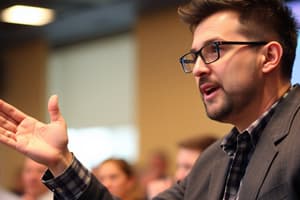Podcast
Questions and Answers
Oratorio differs from opera in that it has no?
Oratorio differs from opera in that it has no?
- Acting, scenery, costumes (correct)
- Vocal soloists
- Choral parts
- Orchestral accompaniment
Terraced dynamics refers to?
Terraced dynamics refers to?
- A gradual change from soft to loud
- Dynamics that are not written in the music but added by the performer
- A gradual change from loud to soft
- The sudden alternation from one dynamic level to another (correct)
A Baroque musical composition usually expresses ______ within the same movement.
A Baroque musical composition usually expresses ______ within the same movement.
one basic mood
Speechlike melody accompanied only by a basso continuo is called?
Speechlike melody accompanied only by a basso continuo is called?
When the subject of a fugue is presented in the dominant scale, it is called the?
When the subject of a fugue is presented in the dominant scale, it is called the?
An _____ is a play, set to music, sung to orchestral accompaniment, with scenery, costumes, and action.
An _____ is a play, set to music, sung to orchestral accompaniment, with scenery, costumes, and action.
Most early Baroque operas were based on Greek mythology and?
Most early Baroque operas were based on Greek mythology and?
Frederick the Great, King of Prussia, was a?
Frederick the Great, King of Prussia, was a?
Castrati?
Castrati?
The French overture has?
The French overture has?
The music director of a Baroque court was usually not responsible for?
The music director of a Baroque court was usually not responsible for?
The various dances of the Baroque suite are usually?
The various dances of the Baroque suite are usually?
An element of the oratorio that is especially important and serves to comment on or participate in the drama is the?
An element of the oratorio that is especially important and serves to comment on or participate in the drama is the?
A ______ is a short instrumental composition based on a hymn tune that reminds the congregation of the hymn's melody.
A ______ is a short instrumental composition based on a hymn tune that reminds the congregation of the hymn's melody.
The ____ is the person who beats time, indicates expression, cues in musicians, and controls the balance among instruments and voices.
The ____ is the person who beats time, indicates expression, cues in musicians, and controls the balance among instruments and voices.
____ is a musical idea repeated over and over in the bass while melodies above it constantly change.
____ is a musical idea repeated over and over in the bass while melodies above it constantly change.
Bach was recognized as the most eminent ____.
Bach was recognized as the most eminent ____.
Study Notes
Oratorio vs. Opera
- Oratorio lacks acting, scenery, and costumes, distinguishing it from opera.
- Both forms feature vocal soloists and orchestral accompaniment, but oratorio is typically concert-based.
Terraced Dynamics
- Defined as sudden alternation between dynamic levels, contrasting gradual changes in volume.
- Important feature in Baroque music, showcasing dramatic shifts.
Baroque Composition Mood
- Typically expresses one basic mood throughout a movement.
- Structures in Baroque compositions often favor consistency over variety.
Secco Recitative
- A speechlike melody supported solely by a basso continuo.
- Different from accompanied recitative, which has more instrumental support.
Fudge Subject Presentation
- When the subject appears in the dominant scale, it is termed the "Answer."
- This concept is key in counterpoint, influencing thematic development.
Opera Defined
- Opera is a dramatic work encompassing music, singing, orchestration, costumes, and action.
- Integrates various elements like ensemble pieces and overtures to engage audiences.
Inspirations for Early Baroque Operas
- Primarily drawn from Greek mythology and ancient history.
- Reflects the era's fascination with classical themes and narratives.
Frederick the Great's Multifaceted Role
- Acclaimed as a flutist, general, and composer, showcasing his diverse talents.
- His contributions to music and culture in Prussia were significant during his reign.
Castrati Singers
- Male singers castrated before puberty who commanded high fees for their unique vocal range.
- Combined masculine lung power with a typically female vocal range, creating a distinct sound.
Structure of the French Overture
- Characterized by two sections: slow-fast, establishing a dramatic opening for operatic works.
- Sets the stage for subsequent musical developments in Baroque compositions.
Music Director's Responsibilities
- Not typically tasked with the publicity of performances to reach broader audiences.
- Focuses on supervision, music composition, and maintaining discipline among musicians.
Baroque Suite Dance Forms
- Dances are primarily structured in AABB form, emphasizing rhythmic patterns.
- This form gives the dances a lively, recognizable character.
Importance of the Chorus in Oratorio
- Serves a crucial role by commenting on and participating in the drama of the narrative.
- Acts as a communal voice within the structure of the oratorio.
Chorale Prelude
- A short instrumental piece based on a hymn tune, serving to remind congregations of the melody.
- Enhances worship experiences by bridging instrumental and vocal traditions.
Role of the Conductor
- Responsible for keeping time, indicating expressions, and cueing musicians.
- Essential for balancing the orchestra and vocal performers during a performance.
Basso Ostinato
- A repeating musical idea in the bass, while melodies above vary, creating rich textures.
- Used frequently in Baroque music to create a foundation over which harmonies develop.
Bach’s Recognition
- Renowned as the preeminent organist of his time, mastering the instrument's complexities.
- His contributions to music theory and composition continue to influence musicians today.
Studying That Suits You
Use AI to generate personalized quizzes and flashcards to suit your learning preferences.
Description
Explore the distinct features and differences between oratorio and opera, including dynamics and mood in Baroque music. This quiz also covers specific elements like secco recitative and fudge subject presentation, providing a comprehensive overview of these musical forms.




